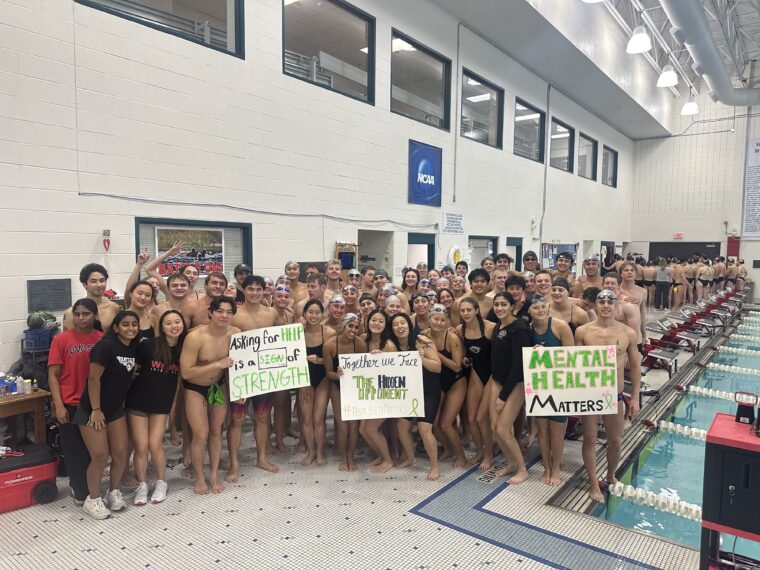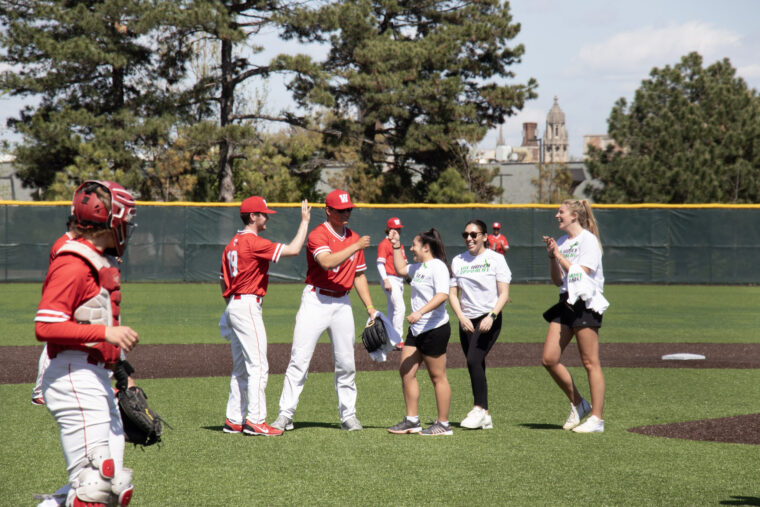Sports | Uncategorized
WashU combats student-athlete mental health stigma

Student-athletes endorse The Hidden Opponent at a WashU swim meet. (courtesy of THO)
Student-athlete mental health is an issue at college campuses across the nation. In 2021, the NCAA surveyed student-athletes across all three of its divisions and found that 31% of female athletes and 37% of male athletes did not know where to go on campus with their mental health concerns. The survey results also revealed that 45% of female athletes and 53% of male athletes felt that their university’s athletics department did not prioritize mental health. However, WashU’s Athletics Department and student-athletes, including WashU’s chapter of The Hidden Opponent, have taken action to support their community.
The Hidden Opponent (THO), a national nonprofit organization promoting athlete mental health advocacy, education, and support, was created because colleges and universities were not doing enough to help their student-athletes’ struggles with mental health. THO encourages athletes to prioritize their mental health and crush the stigma surrounding mental health in athletic environments.
“We want to play a role in changing the conversation [regarding mental health], especially on our campus, where there’s so much academic pressure and so much athletic pressure,” senior softball player Maggie Baumstark said speaking on behalf of THO.
The Athletics Department’s Perspective
In 2019, on her first day as WashU’s Senior Associate Athletic Director, Summer Hutcheson began a dialogue with Athletic Director Anthony Azama to find solutions to improve student-athlete mental health. Alongside Azama and the entire athletics department, they have worked to find channels of support for student-athlete mental health.
“One of the things that we’ve talked about since I arrived was trying to provide more sports psychology or mental health support to student-athletes, and we’ve tried multiple different routes to get that,” Hutcheson said.
One of the routes included creating a full-time coordinator position that specializes in the mental health aspect of student-athlete programming. In 2023, the position was filled by Ali Casco, the current student-athlete development and experience coordinator, who has a master’s degree from the Brown School in social work with a concentration in mental health. Casco’s main focus in her role is creating programming that is centered around WashU´s five anchors of Student Affairs: diversity, equity, & inclusion; leadership; career development; healthy excellence; and belonging & engagement. Although the anchors cover many topics, Casco acknowledged the common thread of mental health across these domains.
The programming is designed to span the four-year student athlete experience from convocation to commencement. She specifically emphasized the importance of assisting graduating athletes with the transition into non-athlete lifestyles. Casco also works with teams and individuals through workshops and resource referrals focused on mental health.
“I am often that bridge to maybe a connection with the speaking lab. Maybe it’s a connection with one of our sports psychologists,” Casco said. “[My role] is not exclusively for mental health concerns. A lot of times it does become that, but it really is a connection to any sort of resource that they could need.”
Around the same time Casco joined, WashU’s Center for Counseling and Psychological Services (CCPS) hired Christie Cunningham as the first of three new full-time sports psychologists. While the psychologists are still being phased in, this was in part due to the advocacy done by the athletics department to bolster support for student-athletes.
Hutcheson noted part of the work that needs to be done is connecting students with current resources.
“I think that the resources are mostly there. It’s just getting people to use them when they need them,” Hutcheson said. “Making sure that [the resources are] more readily available and easy to access is something we still need to work on.”
Beyond connecting students to resources, Hutcheson also emphasized the goal of being proactive and for “student athletes to understand that they don’t have to be in crisis to talk to somebody.” Casco noted that peer advocacy, like The Hidden Opponent, is crucial in expanding the network of support for student-athletes. While the administration can assist in the form of programming and resources, student-athletes are on the grassroots level and can support each other through conversations in the locker room and at team dinners.
Despite the strides the athletics department has made towards providing more mental health support for students, Hutcheson said they are still looking to improve their mental health support.
“If I look back to where we started, to where we are now, I am very pleased with progress, [but] never satisfied,” Hutcheson said. “That’s just something that we as athletes do. It’s like, you can win a national championship, and the very next day, people are like, ‘Okay, how do we do this again?’ It’s just part of our nature.”
The Student-Athletes’ Perspectives

WashU campus captains Owen Block, Anna Freeman, Isabella Barrientos, Maggie Baumstark, and Ally Hackett (left to right) have been crucial in promoting mental health resources for the University’s student-athletes. (courtesy of THO)
WashU’s chapter of THO has existed since 2022 but did not become a Student-Union-recognized club until the fall of 2024. At the time of print, the chapter is made up of 40 members and is led by five “campus captains,” each representing their WashU varsity team.
Although THO targets and is run by student-athletes, anyone—athlete or not—who is passionate about mental health can join. The chapter’s main mission is to increase the visibility of the words “The Hidden Opponent” on campus, which can be seen on shirts, wristbands, and ribbons—all designed to spark conversations about mental health and promote available mental health resources. To do this, a school-wide effort is needed, especially since, as THO campus captain Baumstark puts it, WashU can feel like a “pressure cooker.”
“We want to be the people [who] are using our voices to be louder than the voices that we’ve all grown up with saying, ‘push through, push through, push through,’” Baumstark said. “Now there’s another narrative saying, ‘Hey, you can take a break,’ ‘Hey, you can talk about this.’”
The chapter has also partnered with the athletic administration to promote their mission, oftentimes through events and mental health awareness games.
For many student-athletes, despite how much they love it, their sport can also be a catalyst for anxiety and depression. It is not uncommon for student-athletes who are struggling with mental health to think they are an anomaly, resulting in them having difficulty seeking mental-health support.
When Baumstark learned about THO and realized she was not alone in this experience, her “Earth was shattered.” Since then, it’s been her personal mission to go the extra mile to help other student-athletes realize they, too, are not alone in the fight against mental health.
“Athletics culture is so rooted in pushing through and putting whatever you’re feeling to the side,” Baumstark said. “Dedicating yourself to the grind and pushing and pushing and pushing—that is at least how I was taught you’re a good athlete—to ignore whatever you’re feeling and keep going … That’s the definition of success that’s laid out for you.”
Senior swimmer and campus captain Isabella Barrientos also grappled with the definition of success, causing her to have a panic attack during a swim meet in her first year at WashU. It was not until after the race that Barrientos realized that she needed help.
“My hands were shaking. I was going numb. My fingers were turning purple. I was having a visible panic attack, and I had no idea what that was at the time,” she said. “I just remember feeling like the lights are so bright, the world is shaking, my ears are ringing, and I’m panicking. And I swam through it.”
While the sports psychologists are still being phased into the athletics department, THO leadership credits the presence of the three new sports psychologists on campus as a necessary step to shift the stigma around mental health.
“We [members of THO] want to market ourselves as people who know resources and can get our peers connected to resources or be just a listening ear, but by no means are we going to be trying to offer true mental health support in the way that a licensed professional can,” Baumstark said.
However, if students don’t feel comfortable speaking to a psychologist, THO hosts events like mental health awareness games and journaling nights.

THO sponsored a mental health awareness baseball game, where they threw out the first pitch. (courtesy of THO)
As men are generally less likely to seek mental health help than women, sometimes different strategies need to be implemented to target the stigma experienced by male athletes. To address this difficulty, last year, then-senior and member of the football team Johnathan Smith gathered his teammates for a “mental health and masculinity workshop” to discuss what it means to be a man and to acknowledge mental health.
“I think for men’s sports, it is entirely different, and there is a different stigma around [mental health],” sophomore baseball pitcher and campus captain Owen Block said. “It can be tough to foster a team culture where mental health for all guys on the team is a big priority, along with physical health.”
In the future, THO hopes to have members represent every varsity team as well as form more cohesive connections among WashU sports teams and with the athletics department administrators.
Slogans like “Bears support bears” and “19 teams, one family” are mottos that are commonly discussed in WashU athletics. Embracing these ideals, which coincide with THO’s mission, is necessary to ending the stigma around student-athlete mental health.
“If you’re not comfortable [speaking up] yet, just listen and be an advocate by not discouraging someone else who does feel inclined to talk,” junior Xander Georgoulis, a member of THO and a defensive back on the football team, said. “ … Everything is going on differently in someone’s life, and if you don’t have anything great to say about it, then just focus on yourself, and we can all continue to get better, both physically on the field and mentally.”
